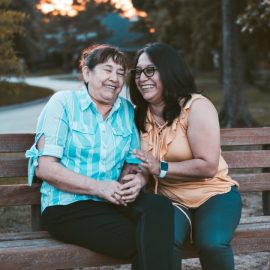

This article is an excerpt from the Shortform book guide to "Radical Acceptance" by Tara Brach. Shortform has the world's best summaries and analyses of books you should be reading.
Like this article? Sign up for a free trial here .
Why is compassion such an important part of Radical Acceptance? Why is it so difficult for us to show compassion towards ourselves?
Radical Acceptance is made up of two parts: mindfulness and compassion. Compassion is so powerful because it goes against our inclination to run from pain. However, we need to learn to treat ourselves with compassion before we can show it to others.
Keep reading to learn more about the power of compassion.
Compassion and Radical Acceptance
The word compassion means “to feel with.” Compassion is when we respond to pain—our own or someone else’s—with tenderness and love. It goes directly against our societal conditioning, which tells us to run from pain. However, compassion allows us to embrace our experiences instead of constantly fighting against them. Far from avoiding pain, we have to intentionally focus our attention on it in order to cultivate compassion. The power of compassion should not be underestimated.
Pain, whether physical or emotional, can create an insidious trap. When we’re suffering, we tend to blame ourselves for it. Someone might tell himself that his back hurts because he doesn’t take proper care of himself, or that his relationship fell apart because he wasn’t attentive enough. This puts us into the trance of unworthiness. It also makes having compassion for ourselves difficult, because we feel like we deserve to suffer.
For many of us, offering compassion to others comes easily, but offering it to ourselves feels self-indulgent or even shameful. We might feel like we’re being needy, or that we don’t deserve to treat ourselves with compassion.
However, in many cases, compassion is necessary for emotional and spiritual healing. Meeting our own pain with compassion can start to undo the social conditioning that makes us feel ashamed. When we’re blocking out painful experiences, compassion helps to bring down the walls.
Compassion Towards Ourselves
In Buddhism, we usually begin by being aware of our own pain. Once we’re able to respond to our own pain with compassion, we’ll be more open to meeting others with that same compassion. However, as we’ve said, some people find the opposite to be true; it’s easier for them to have compassion for others first, and then to bring that same attention to their own experiences. Either way, relating to pain with love instead of resistance is how we awaken compassion within ourselves.
As always, physical experiences are a good place to begin. Consider how your pain is manifesting. Even if it’s emotional distress, draw your attention to how it feels. For example: is your heart racing, or your stomach upset? Where are you holding tension in your body?
The next step is to meet that suffering with compassion. We can say to ourselves, “I care about this pain. May this pain kindle compassion.” It’ll probably feel strange at first, or even embarrassing—we aren’t used to offering ourselves compassion in this way. However, by continuing to practice compassion for our own pain, we can start to let go of our own pains and the insecurities that come with them.
The vulnerable parts of ourselves need comfort and support, so by offering that to ourselves we can find a new sense of openness and awareness. Instead of protecting ourselves by withdrawing, curling inward to protect ourselves, we can find the strength and security to open up to the world around us instead.
A side note: Holding ourselves with love and compassion doesn’t free us from responsibility for our actions. However, it does free us from the self-judgment and self-hatred that prevents us from responding with clarity and understanding. Remember the core of Radical Acceptance: We must understand and accept our experiences without being ruled by them.
Widening our Awareness
There may be times when our pain or shame is too great to face alone. This is especially the case when our actions have harmed others. When we know that we’ve played a part in another’s suffering, it’s hard to believe that we deserve to feel better. When that’s the case, we often have to widen our awareness in order to hold the pain without it destroying us.
One of Tara Brach’s students, a woman named Marian, found herself in such a position. She’d lost herself in alcoholism to cope with the pain of a messy divorce. As a result, Marian wasn’t aware that her new husband had been sneaking into her daughter’s room and sexually assaulting her while Marian was drunk or asleep downstairs.
When she finally learned what had been happening, Marian tormented herself with guilt and self-reproach. The pain and shame of knowing that she’d allowed her daughter to suffer so much seemed unbearable. Finally, Marian sought help from a former teacher of hers, a Jesuit priest.
The priest advised her that she was living in a place of pain. That place couldn’t be avoided, and there was no sense in trying to run or hide from it. However, if possible, she should try to remember that there was also a much greater place, the kingdom of God, which could hold both her pain and the love she needed to heal.
This story is reminiscent of the young Siddhartha Gautama, who sat watching the farmers work. Much as he realized that the world is big enough to hold both suffering and joy, Marian’s first step to healing was recognizing that the world (or, in her case, God) was big enough to hold both pain and love.
Reaching Out With Mindful Prayer
It might seem like the priest’s answer of seeking refuge in God is only applicable to Christians, or others who follow God-centered religions. However, we all tend to reach out to greater forces during difficult times. Someone suffering from a terrible headache might beg for the pain to stop, or someone who desperately wants something might plead for it to happen. We do this even if we don’t know who or what we’re asking for help—maybe we give this unspecified presence a label like “the universe.” No matter who or what we reach out to, the reason is the same: We feel alone, and we want the pain of isolation to end.
When we combine mindfulness practices with this type of reaching out, we can practice mindful prayer. With mindful prayer we reach both outward and inward: We look outward for help, support, and love, and we look inward to listen to the suffering that’s provoking our prayer. In doing so, we become both the one who is suffering and the one who offers compassion.
Mindful prayer allows us to touch our fear and our pain without getting lost in trances of judgment and feelings of unworthiness. Marian, the woman who didn’t know her daughter was being abused, found compassion that could hold both her pain and her daughter’s pain by practicing mindful prayer. Like any kind of spiritual practice, mindful prayer becomes more powerful the more we practice it. Whenever we feel our hurts and our fears creeping in, we can reach both outward and inward. In doing so, we can accept the pain and use it as a gateway to compassion.

———End of Preview———
Like what you just read? Read the rest of the world's best book summary and analysis of Tara Brach's "Radical Acceptance" at Shortform .
Here's what you'll find in our full Radical Acceptance summary :
- How to live your life fully experiencing everything
- Why you need to let go of judging yourself or your experiences
- How you can acknowledge and welcome any experience






